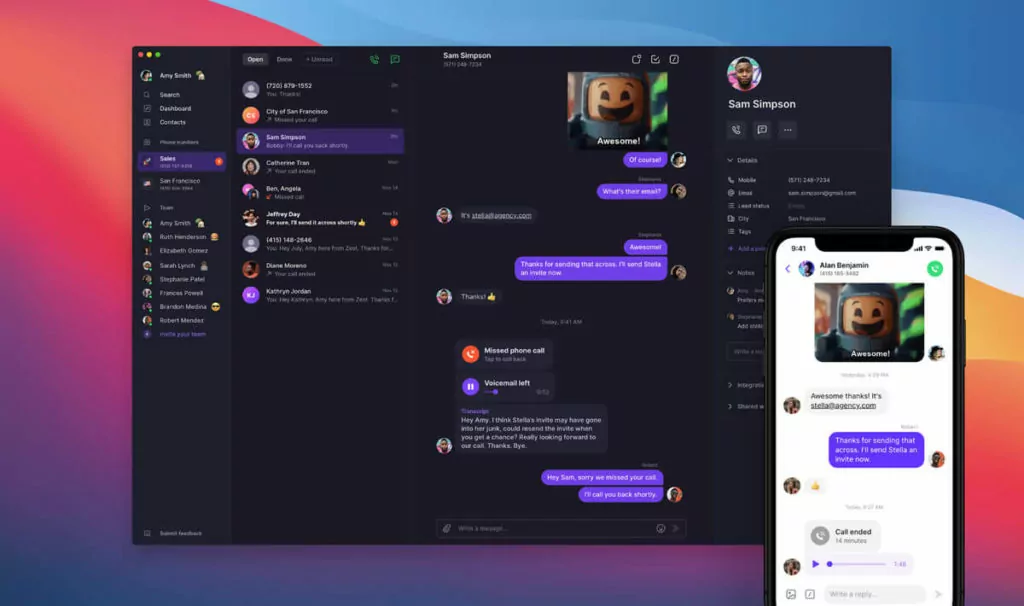Business owners are problem solvers. Whether your printer is jammed (again) or your office snacks keep magically disappearing (in your mouth), you’re always searching for newer, better solutions. 🔍
When the issue you’re running into is inefficient business communication, the fix may be as simple as this: Ditch the clunky desk phone and embrace virtual private branch exchange, better known as virtual PBX.
Let’s learn what virtual PBX is all about and how it can take your small business to the next level.
What does virtual PBX mean anyway?
Virtual PBX, hosted PBX/PABX, cloud PBX, VoIP — there are a million terms for it, but virtual PBX always refers to a special type of business phone system that runs on an internet connection. This means it doesn’t need any dedicated hardware at all. Your phone is completely virtual. It’s hosted on the cloud, so you can easily access it from your smartphone, tablet, or computer.
With a virtual PBX phone system, you get everything a desk phone offers — and usually much more — just by downloading an app or jumping on a website.📱 You can communicate with clients or your team from anywhere.
On the flip side, traditional PBX (aka on-premise PBX) phones require you to physically store servers and other bulky hardware in your office space. For remote teams and many small business owners, this simply isn’t feasible or desirable, which is why so many are making the switch.
7 benefits of virtual PBX services
A virtual PBX solution can make your business life much easier. It’s packed full of features for a truly all-in-one phone service — so you don’t just get one service for all that on-premise PBX hardware.
Here are seven benefits of virtual PBX and the features that make them possible:
1. Low startup costs
One of the biggest draws of virtual PBX is the fact that you can implement it in your business for thousands of dollars less than a traditional PBX phone. There’s no need to invest in additional hardware. With the flexibility to use any mobile device or computer, your team can simply use the equipment they already have on hand, which means no wasted office space either. More room on your desk for coffee number two! ☕
Virtual PBX phones are also easier for your team. They’re user-friendly — no need to memorize codes — and function just like the mobile apps we all use in our day-to-day lives, so training will be simple, fast, and cost-effective. Why dial *72 for call forwarding when you could just tap “Forward Calls“?
At OpenPhone, we’ll even provide customer support, which means you don’t need to hire an IT expert of your own.
2. Easy to scale
Virtual PBX makes scaling faster and more cost-effective too. No hardware means practically no setup when new members join your team. You simply need to invite a team member and accept a small monthly pricing update, and they’ll be able to access the full functionality of a business phone from whatever device they’re using.
With OpenPhone, you can even seamlessly share contacts (or share a phone number) with teammates right on your virtual PBX app. Your new team hires can start helping customers or collaborating with your team right away.
Another reason scalability is easy with virtual PBX: It gives your team the flexibility to work from all over the world. OpenPhone supports international calling — with unlimited phone calls in the US and Canada. You can now expand your hiring pool and attract the best of the best to your team.
3. More ways to communicate
Compared to traditional phones, virtual PBX phones certainly have advanced features. Since they’re internet-based, they can help you manage more than phone calls and voicemails. For example, you can also send text messages (including group messages), set up auto-replies, and set up business hours to avoid after-hours notifications.
OpenPhone also functions as a lightweight CRM. You can add details about who you’re chatting with in your app, so you can understand who you’re calling or messaging and provide a better customer experience. OpenPhone can even integrate with more robust CRMs like HubSpot to help you organize and understand your leads and clients even better.
4. Streamlined business processes
Virtual PBX brings automation to your business calls in several ways.
First, you can set up an auto-attendant. This creates an audible menu that plays as soon as someone calls your virtual phone number — you’ve used one if you’ve ever heard something like “press one for customer service.” Once the caller selects an option, the auto-attendant will handle the call routing for you, so you don’t need a secretary to field every call, and you won’t get bombarded with incoming calls that are meant for other team members.
Virtual PBX can also offer a number of integrations, so you can link up your favorite business tools. For example, OpenPhone can connect with Slack, so you can read your text messages and voicemails where you’re already collaborating with your team.
5. Free updates
Updates for desk phones can be incredibly frustrating. When your phone system gets outdated, you may need to invest in brand-new equipment — then set it all up.
With virtual PBX, it’s as simple as updating your app. Not only will this save you a ton of money, but it also means your service provider can fix bugs quickly, so your phone lines are never down for long (if ever).
6. More insights
Want to help your team function better? Virtual PBX can provide the insights you need to improve.
You can learn about when you’re busiest, how long team members are spending on calls, and more. This will help you staff the right people at the right times and create more efficient processes for client communication.
Virtual PBX also allows you to use call recording features for interviews, client meetings, conferences, and more — making it easier to review any business information you discussed. Just be sure to follow legal guidelines.
7. High reliability
Just like a good slice of bacon, the quality of virtual PBX doesn’t change. 🥓 With high-speed internet comes crystal clear calls. Switching to a softphone, as virtual PBX phones are sometimes called, reduces many of the sound quality and service issues that you may experience with standard smartphone calls.
At OpenPhone, we’re proud to have the consistent uptime to prove it.
It makes sense if you look at the basic science behind it. Landlines are basically professional versions of the string telephones you make in elementary school, sending your voice over a wire, while cellphones use radio waves, which can easily get cut off — as anyone who has driven long distances or under a tunnel knows
Virtual PBX, on the other hand, sends your voice as digital “data packets,” which are also used to send emails, so less is lost in the process.
With virtual PBX, you can also achieve faster connection, so you can answer inbound calls more quickly. Even your most impatient customers will be happy!
Get the virtual PBX experience firsthand

Whether you use an iPhone, prefer Androids, or just want to skip the smartphone debate and use your laptop, virtual PBX can be the business phone solution for you. By moving your phone system onto the cloud, you’ll have less clutter, fewer costs, and far more flexibility in how you communicate with clients and your team. Experience virtual PBX with a free trial of OpenPhone today.
